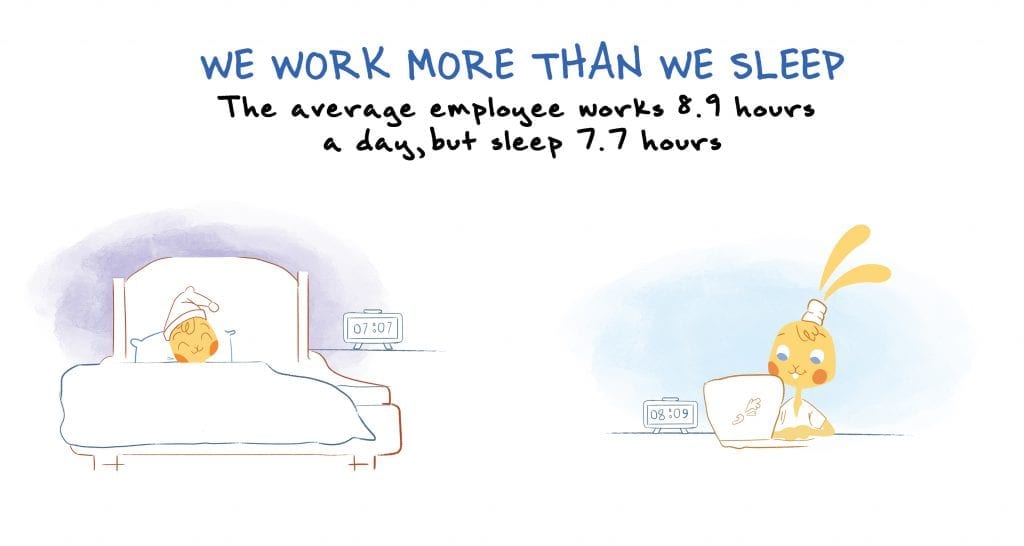

“The difference between an amateur and a professional is in their habits. An amateur has amateur habits. A professional has professional habits. We can never free ourselves from habit. But we can replace bad habits with good ones.” -– Steven Pressfield
It’s true. Professionals are always at the top of their game. And, in order to achieve that they focus on healthy habits like sticking to a schedule, embracing failure, and finding ways to improve. Or, as Denna Ritchie puts in a previous Calendar article, “habits can help us become the best possible versions of ourselves.” In turn, “we’ll be healthier, happier, and more productive.”
Even more impressive is that habits are so powerful, our brains crave them since they create neural cravings. Or, to put it in lamen’s terms, specific behavior is rewarded through the release of dopamine.
So, how can you create and stick habits? Well, Deanna suggests the following process:
- Start incredibly small by using the Fogg Behavior Model; “After I [TRIGGER], I will [TINY HABIT].”
- Be specific and make the habit satisfying.
- Tap into the habit loop. Although popularized by Charles Duhigg, this phenomenon has been studied by Dr. Ann Graybiel since the ’90s. To create new habits, Duhigg writes it’s achieved “by putting together a cue, a routine, and a reward, and then cultivating a craving that drives the loop.” You can also use this technique o reshape habits.
- Know your habit tendency so that “you can then design an environment to match your propensity.”
- Overcome excuses by removing friction. For example, pack a gym bag and leave it in your car so that you can go directly to the gym after work.
- Create a habit calendar so that you can track your progress and remain motivated.
Now that you have an idea of why habits are important and how to build them, its time to figure which ones you should implement for performance productivity. And, here are twenty such habits that you should prioritize.
1. Seek clarity.
Following 20 years of research, Brandon Burchard found six habits of high performers. And, at the top of the list? The idea of “seeking clarity.”
“High performers don’t necessarily get clarity,” explains Jeff Haden “Instead, they seek it more often than other people — so they tend to find it and stay on their true path.” One example of this is not waiting a new year to conduct a self-evaluation.
“High performers constantly seek clarity,” adds Haden. “That makes them better at sifting out distractions because they constantly refocus on what is important.”
“A simple approach to seeking clarity is to focus on four things: self, skills, social, and service,” Haden states. “How do you want to describe your ideal self? How do you want to behave socially? What skills do you want to develop and demonstrate? What service do you want to provide?”
“Asking — and answering — those questions more often than other people will give you an edge.”
2. Plan and prioritize.
While I wouldn’t recommend it becoming the norm, just try and go a couple of days without planning and prioritizing. Life, to put it bluntly, would be chaotic, stressful, and definitely less productive. So, if you haven’t done so yet, make both of these a part of your routine.
To be fair, this may be timeconsuming and painful at first. But, as you go on, it will become much easier to do. And, that means when you do get this down, you’ll get more done without jeopardizing your performance.
Need a starting point? Here are 25 tips on optimal time prioritization.
3. Treat your body right.
“Typically, people who exercise, start eating better and becoming more productive at work,” writes Charles Duhigg in The Power of Habit: Why We Do What We Do in Life and Business. “They smoke less and show more patience with colleagues and family.” Also, adds they use “credit cards less frequently and say they feel less stressed.”
In short, “Exercise is a keystone habit that triggers widespread change.” What’s more, according to the Brookings Institute, “an exercise routine can give you more energy throughout the day.” And, as if that weren’t enough, this habit “will help keep you mentally sharper throughout your entire life.”
Besides engaging in regular physical activity, other ways you can treat your body right is getting seven to eight hours of sleep each night and eating healthy and nutritious food. And, also don’t forget to neglect your mental health. If you’re feeling stressed, anxious, or depressed, find ways to alleviate these feelings or seek out help immediately.
4. Make complacency your enemy.
Make it a point to learn and experience new things continually. According to CCSU Business & Development, this will increase the density of your myelin or the white matter in your brain. As a result, it will improve your performance. Additionally, this habit will help you learn things faster and build connections between skill areas. Most importantly, it will make you a more-rounded and marketable individual.
Sign-up for an online course or attend a workshop. Carry a book with you at all-times. Listen to informative podcasts. Play brain games during breaks. And, break out of your comfort zone occasionally.
5. Seize the morning.
“A majority of highly successful business executives, entrepreneurs, and celebrities wake up early so that they can make the most out of every minute of their day — especially their mornings,” writes Rose Leardem. “And most use this quiet time to prepare for the day ahead, get in the right mindset, and set a positive and productive tone for the day.”
But what exactly should you do each morning? Well, if you’re morning bird, wake-up before everyone else. Even if you’re a night owl, you should still have a morning routine that includes; making your bed, eating breakfast, exercising, practicing mindfulness, and doing the most challenging task first.
6. Declutter your life.
Clutter can be distracting and stressful. It can even slow you down and make you less efficient since it can “clog neural networks.” That’s why successful and productive people make decluttering a habit.
Of course, this varies from person to person. But, at the minimum, you can implement this by cleaning and keeping your workspace organized. You should also do this at home and for your vehicle as well. To ensure that this is a priority, schedule into your day, like during the last fifteen minutes of your workday.
Other options would be reducing or dropping unnecessary or unimportant tasks and removing toxic people from your life. You can also start simplifying your goals and stop multitasking.
7. Listen to constructive criticism.
Don’t fear and avoid negative feedback. Welcome and seek it out. The reason? It will help you identify your strengthens and weaknesses. Knowing this, you know where you need to change and grow, as well as what you can eliminate from your schedule.
8. Cultivate deep work.
Coined by author Cal Newport, deep work “is the ability to focus without distraction on a cognitively demanding task.” Cultivating this will help you “quickly master complicated information and produce better results in less time.” It will also “make you better at what you do and provide the sense of true fulfillment that comes from craftsmanship.”
You can achieve this by:
- Scheduling deep work when you’re at peak productivity.
- Knowing your work habits, like when you need breaks and preferred environment.
- Reducing distractions by turning off your phone or blocking apps at certain times.
- Getting comfortable with boredom so that you don’t seek out distractions.
9. Write down your thoughts.
“Everyone takes a little time out of their day to daydream. Those are also the times when you come up with some of the best ideas,” writes Renzo Costarella. “More often than not, however, people don’t write their best ideas down.”
Instead, try to be more like Richard Branson, Bill Gates, Tim Ferriss, and Sheryl Sandberg — they are all known for keeping a notepad nearby to capture thoughts and ideas — which can later be used to make goals. Furthermore, note-taking can clear your mind so that it’s not overloaded with information, improve your memory, and make you a better communicator.
“I personally try to write down three business ideas every single day just to stay creative. Granted, most of them aren’t the best, but it’s a great way to practice creativity,” adds Renzo. I’ve used notebooks to jot down my random thoughts, reflect, and what I’m grateful for.”
10. Make time to recharge.
Whether if it’s taking frequent breaks throughout the day or using downtime to your advantage, you need time to recharge. When you do, you’ll return to your work, feeling more focused and energized.
11. Seek out problems, but also look for shortcuts.
“High performers learn to habitually observe challenges that arise and consider the ways to ease or correct them instead of mindlessly or habitually accepting the status quo as ‘all there is’ or ‘good enough,'” writes Cheryl Snapp Connor. “The result of this habit: increased innovation.”
At the same time, they also learn how to make their lives easier. Examples would be teaching shortcuts or known which responsibilities can be automated or delegated.
12. Visualize.
Arnold Schwarzenegger once said, “Create a vision of who you want to be, and then live into that picture as if it were already true.” You can do this by making visualization, or daydreaming if you like, a part of your daily routine. Ideally, this would be when you first wake up or right before bed. But, you can also do this during breaks in-between tasks.
13. Be aware of your limitations.
High performers are known for pushing boundaries. But, they’re also well aware of their limitations. If they don’t have the skills or knowledge to finish a job, they’ll find someone who can. They may even learn this specific skill so that they can do the job themselves in the future.
14. Develop influence.
Regardless if it’s sharing your knowledge or knowing how to motivate others, successful people know how to develop influence and get the most out of those around them.
15. Never break commitments.
Whether if it’s starting something new, meeting deadlines, or respecting other people’s time, always follow through. If this is an area you struggle with, then go through your calendar. What can be removed or rescheduled? It’s a simple way to avoid scheduling conflicts and dropping the unimportant.
16. Look through a one-inch picture frame.
What does this mean? Well, it’s a better way of saying that high performers prevent getting overwhelmed by focusing on one small thing at a time. As explained by author Anne Lamott in Bird by Bird, “I go back to trying to breathe, slowly and calmly, and I finally notice the one-inch picture frame that I put on my desk to remind me of short assignments.”
“It reminds me that all I have to do is to write down as much as I can see through a one-inch picture frame,” writes Lamott. “This is all I have to bite off for the time being.”
17. Have targets.
Targets, according to Bernard Marr, “don’t just tell us what we are aiming for. They also “let us measure the distance by which we fall short, and the amount of work we need to do to make it up.”
If you need help setting targets, Marr suggests that they be specific and realistic. He also advises that you support important objectives with lower-level targets.
18. Surround yourself with positivity.
“They say if you want to become a better tennis player, you should play with someone more skilled than you,” writes Jennifer Cohen in Forbes. “The same is true for most things in life.”
“We pick up a lot from the people we surround ourselves with—both positive and negative,” adds Cohen. “So, if you are trying to be more successful and productive, establishing relationships with people who have what you want can help get you there.”
Her suggestion? If those around you “aren’t at the top of their game, it might be time to reach out and network. Try to find a mentor, or become part of a mastermind group. Even if you don’t end up establishing a relationship with people in your field, anyone with a positive, encouraging attitude is likely worth your time.”
“If you continue to reach out and still can’t find people you connect with, you may want to consider hiring a high performance or executive coach,” recommends Cohen.
19. Overcome fear.
Fredrick Smith once said, “Fear of failure must never be a reason not to try something.” But, for so many of us, this holds us back from pursuing our dreams. Instead, do something that scares you every day. Start small, like trying out a new food for dinner or taking a public speaking class. From there, use that momentum to help you overcome your more significant fears.
20. Show yourself the “money.”
“To drive lasting productivity, make assessing your progress and enjoying the fruits of your labor part of your routine,” suggests Tony Robbins. “Check in with yourself to confirm that you are accomplishing your goals and tasks.” And, after succeeding, “allow yourself to enjoy that feeling of achievement.”
“In this way, you train your mind to focus on goals, attain them and derive pleasure from a job well done,” adds Robbins. Additionally, this will remind “you that you are highly competent and capable of setting, accomplishing, and even beating goals.” As a result, you’ll develop a sense of self-efficacy, which is a “powerful tool in learning how to increase productivity.”











John Hall
John Hall is the co-founder of Calendar a scheduling and time management app. He’s also a keynote speaker that you can book at http://www.johnhallspeaking.com.